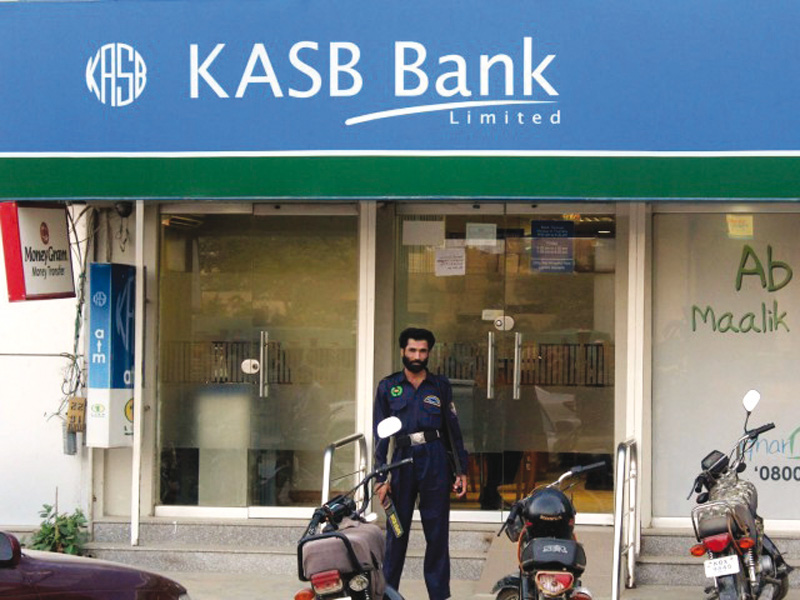
In a new development in the KASB scandal, a recent petition has revealed that former finance minister Abdul Hafeez Shaikh had asked KASB Bank to take deposits of Iranian companies only after having meetings with Shaikh and then foreign minister Hina Rabbani.
The petition revealed that when the Americans sought explanation, the State Bank of Pakistan broke its allegiance to KASB Bank and put the entire responsibility on the bank, despite giving regulatory approval for accepting the deposits.
Barrister Aitzaz Ahsan has filed the petition in the Islamabad High Court on behalf of the sponsors of KASB Bank, praying the court to direct the SBP to involve the owners of the bank in sell-off negotiations and stop the regulator from lifting the four-month moratorium to avoid a run on the bank.
The petition gives a detailed account of how the former finance minister approached KASB Bank to accept Iranian deposits with full knowledge of the SBP. In November last year, the SBP placed a moratorium on KASB Bank for six months, restricting the bank from dealing with the customers to protect the depositors’ interests. One of the reasons behind the SBP’s action was a controversy over the Rs20 billion Iranian deposits with the bank, which the US claimed was in violation of its sanctions.
Case details
Petitioner Nasir Ali Shah Bukhari, who has a 40% stake in KASB Corporation that owns the bank, said, “the then finance minister (Dr Abdul Hafeez Shaikh) requested Nasir Ali Shah Bukhari that it would be in the country’s interest to attract foreign currency deposits of Iranian oil proceeds”. He said Shaikh’s intentions were to build the depleting foreign currency reserves.
The petitioner revealed that KASB Bank decided to accept the deposits only from those Iranian companies, which were not subject to the UN sanctions.
Shahzad Ashfaq, owner of Silk Route Investments, through his Malaysian contacts got Naftiran Intertrade Company (NICO), an oil and gas trading company based in Switzerland, to deposit Iranian sale proceeds from Malaysia with KASB Bank, states the petition. NICO sought government’s assurances.
On September 14, 2011, Ashfaq arranged a visit of the NICO management to the then foreign minister Hina Rabbani Khar in the Foreign Office. “Khar assured them that in Pakistan their funds will be safe as NICO was not subject to UN sanctions.”
The next day a meeting was held with Shaikh at the Ministry of Finance. Later on, a meeting was arranged with the NICO’s MD and the then SBP governor Yaseen Anwar.
Subsequently, Iranian companies started depositing funds with KASB. The Iranians paid Ashfaq’s company for facilitation, the petition revealed. Energy Global International, owned by an Irani, also deposited huge funds with KASB Bank.
Under the SBP regulations, foreign deposits cannot be more than 20% of total bank deposits. To facilitate more Iranian deposits, the SBP increased the ceiling to 100% for KASB Bank, the petitioner claimed.
The twist came in 2012 when the US sanctions enforcement agency, Office of Foreign Asset Control (OFAC), noticed these deposits. The SBP “pleaded its complete ignorance and left KASB Bank out in the cold”, the petitioner claimed.
However, KASB brought the facts to the knowledge of OFAC, which “infuriated” officials of the SBP.
Allegations against SBP
The petitioner claimed that the SBP has been taking revenge of the action and first forced Bukhari to alienate himself from the KASB affairs. It also converted all Iranian foreign currency deposits into Special Convertible Rupee Accounts.
The petitioner claimed that when KASB Bank faced problems and engaged with other commercial banks for merger talks, the SBP officials warned these banks not to talk with KASB for any merger or takeover. The petitioner alleged that as a result the Bank of America Merrill Lynch terminated its long-term relationship with KASB Securities.
The petitioner said that even in today’s worst circumstances, based on the prevailing share price in the stock market, the bank is valued at Rs3.57 billion by the ordinary pubic but the SBP wants to sell at virtually zero.
Published in The Express Tribune, February 12th, 2015.
Like Business on Facebook, follow @TribuneBiz on Twitter to stay informed and join in the conversation.






1719053250-0/BeFunky-collage-(5)1719053250-0-270x192.webp)










COMMENTS (14)
Comments are moderated and generally will be posted if they are on-topic and not abusive.
For more information, please see our Comments FAQ